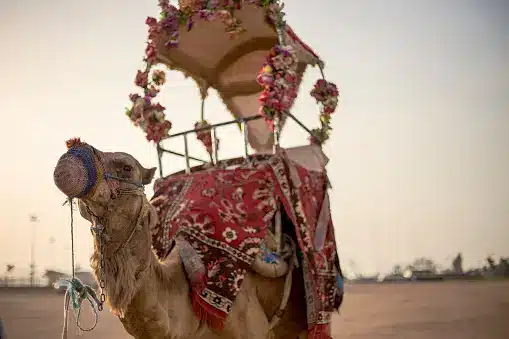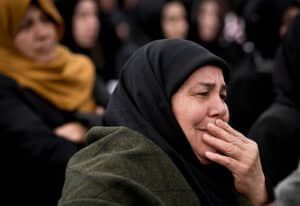
The Bedouins Nomadic life still thrills the People that are part of the modern urban lifestyle. Different Nomadic Groups used to be in large numbers during the ancient and medieval periods. However, with time and the advancement in the lifestyles of the people, Nomadic Groups are rarely seen roaming from one place to another place in search of food and shelter. Every Nomadic Group used to have its traditional Music, Art, Dance, Poetry, and Cuisine.
The Bedouins are the Arabic Nomadic tribes that originated in the Syrian and Arabian Deserts since 6000 B.C. The term has been derived from the Arabic root ‘Badawi’ meaning the ones who dwell in deserts. After living for a long time in one place, the Bedouin tribes used to leave their earlier place in search of better food and Shelter. As the spread of Islam started in the Arabian Peninsula, the large majority of Bedouins accepted Islam as the true religion and later moved to the different areas of Western Asia and East Africa. There they preached the Universal message of Islam and many people accepted Islam on their call (Project, Arab, Bedouin in Saudi Arabia).
Historically, the Bedouins are divided into various tribes and clans. Rearing and Herding Sheep, Camels, and Goats were the common occupations of these tribes. In different regions, these are addressed with different names in the local language of the different regions. Every tribe shares a common love for Music, Art, Dance, and Poetry. Although the vast majority of Bedouins now follow the Urban lifestyle, the love for the culture is still inherent in their veins and many Bedouins every year gather together and share their ancient culture (Project, Arab, Bedouin in Saudi Arabia).

Islam as a religion had a very positive impact on the Bedouin tribes residing in the regions of pre-Islamic Arabia. When MUHAMMAD (S.A.W.) started preaching about Islam, he first created a sense of love and attachment between different Bedouin tribes. They were unified by MUHAMMAD (S.A.W.) and came under the umbrella of Ummah. ‘Ummah’ is a term largely used to describe the unified Muslim Community.
MUHAMMAD (S.A.W.) from his very early childhood was famous in Arabia for his Honesty and trustworthiness. He was addressed by the people of all tribes as ‘Al Amin’ (meaning the trustworthy), and ‘Al Sadiq’ (meaning the truthful one). After the announcement of Prophethood, a good number of Kuffars (disbelievers) accepted Islam as a true religion. The Bedouins that were residing in the regions of Medina and the nearby Arab regions were largely influenced after seeing the Honesty and Truthfulness of MUHAMMAD (S.A.W.).
The different Bedouin tribes in Pre-Islamic Arabia used to involve in different wars and small fights and MUHAMMAD (S.A.W.) played the role of an arbitrator and unified them under the banner of Islam. The various Bedouin groups in Pre-Islamic Arabia used to have a ‘Shaykh’ that played the role of an arbitrator to keep the peace within the tribes. Various decisions inside the tribes were made and passed by the Judges (Hakams). However, the powerful people of these tribes were not able to counter the conflicts among their tribes. MUHAMMAD (S.A.W.) teachings of Islam inspired and influenced the Bedouin tribes and made them unified like brothers. No ‘Shaykh’ or ‘Hakam’ ever proved to be so much a good arbitrator and a leader for the Bedouin tribes. After the Bedouins accepted Islam, they started treating each other as real and close brothers. The Qur’an also makes it clear that all the Muslims unified under the banner of ‘Ummah’ are brothers to each other (Maududi et al., 2022).
Al Qur’an (Ch49, v10)
Also, the stubborn religious Zealots from different Bedouin Groups could not stop themselves longer from accepting the message of Islam after getting impressed by the unique Good behavior of the MUHAMMAD(S.A.W.). Various true events are recorded in Sahih Hadith about the behavior of MUHAMMAD (S.A.W.) with the stubborn individual from different Bedouin tribes. One such event is recorded in History when a Bedouin came to MUHAMMAD (S.A.W.) and asked him to offer some Money and Gold. The Prophet of Islam offered him Gold. However, he was not fully satisfied with the amount received and asked for more Gold from the Prophet. The Companions got angry. However, Muhammad (S.A.W.) asked the companions to keep patience. Later Muhammad (S.A.W.) took the individual to his home and offered him more Gold. After seeing the simplistic home and lifestyle of the Prophet, the man from the stubborn group of Bedouins got impressed and asked for forgiveness from MUHAMMAD (S.A.W.).
A similar kind of event is recorded in ‘Sunan An Nasai’. Once a Bedouin entered a Masjid (Mosque) and Urinated on the floor of the Mosque. The Sahaba got angry. However, MUHAMMAD (S.A.W.) asked the companions to keep patience and poured water over the floor (Sunan an-Nasa’i 54 – The Book of Purification). This is how MUHAMMAD’s pious character impressed the people and the Bedouins were no more an exception to this.
Sunan an-Nasa’i (Hadith 54)
The people from different Bedouin tribes were also involved in different Battles fought against Kuffars (disbelievers), also known as ‘Ghazwa’. After MUHAMMAD (S.A.W.) took a veil from this planet, the Sahaba (Companions) from different Bedouin tribes took the responsibility of preaching the Universal message of Islam. They took the message with them along with the other companions to the rest of the Arab regions, and later it spread to parts of Asia and Africa. This was the time when Bedouins stepped their feet outside the Arabian peninsula.
Thus, Islam had a powerful religious, political, and Inspirational influence on various Bedouin groups that lead to their spread in parts of Western Asia and Africa. A large majority (approx. 95%) became Muslim, while very few people from different Bedouin tribes follow Christianity as well.
Urbanization and the powerful shift in the global technology and lifestyle of People have also shaped the lifestyle of a large number of Bedouin tribes too. Nowadays, many Urban Bedouin Groups are no longer Nomadic and thus are mixed with the people following the Urban lifestyle. However, many still have not forgotten their ancient culture, and the love for traditional Music, Poetry, and dance are still alive. The Bedouins have a very rich History before the Pre-Islamic Arab and even after they got influenced by the great teachings of Islam.
Table of Contents
ToggleREFERENCES
Project, J. (no date) Arab, Bedouin in Saudi Arabia, Joshua Project: People Groups of the World. Available at: https://www.joshuaproject.net/people_groups/10758/SA (Accessed: December 11, 2022).
“Bedouins” Encyclopaedia of Islam, Second Edition [Preprint]. Available at: https://doi.org/10.1163/1573-3912_islam_dum_0650.
Maududi, I.K./ et al. (2022) Surah Hujurat [49] – translation, transliteration, and Tafsir, My Islam. Available at: https://myislam.org/surah-hujurat/ (Accessed: December 11, 2022).














